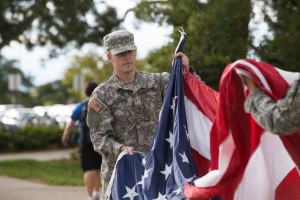
President Obama faced harsh criticism on social media in September for stepping off the presidential helicopter and saluting two Marines while holding a styrofoam coffee cup in the same hand. In Sept. 2014 many have accused President Obama’s “latte salute” as being disrespectful to both the United States Armed Forces and American patriotism in general.
While those who commented were quick to question the president’s patriotism, the American public is slow to examine its own levels of respect. Even political participation and patriotism at BYU remains questionable.
BYU ROTC cadets stand ready in uniform at the flagpole in front of the ASB each morning to raise the American flag. “The Star-Spangled Banner” plays throughout campus as these cadets attach the flag to the pole and raise it into the sky.
Students, staff and faculty walk busily to their appointments. Some immediately stop and place their hands over their hearts when the song begins to play. Others walk on, talking on the phone or rushing to class. Some slow down, look around and eventually place their hand over their heart, watching for others’ approval.
Brooke Davies, a senior from Portland, Oregon, rushed to an appointment one day as the music played. Davies said she was running late, but she usually stops for the flag, depending on where she is and her schedule.
Some students, though late, still pause to honor the flag. Ryan Smith, a junior from Sandy, said he stops even if he’s running late. Stopping for the flag is important to him because he wants to show respect for his country and for the military men and women.
Stopping for the music may seem inconvenient, but to some it sparks feelings of family and home. Alex Samann, a sophomore studying family history genealogy, believes in the importance of tradition. “I always stop,” Samann said. “My mom served in the military, and even if you’re late, you should still stop for those people who died for that flag.”
Sometimes American BYU students forget that international students are watching them for cues about American customs.
Chris Lau, a sophomore from Hong Kong studying biochemistry, watched students during the national anthem ceremony on campus. “I’m not from America. The first time I saw people stopping I stopped out of respect. But then I saw Americans walking, so I thought it was OK to walk,” Lau said.

Tyler Girsberger, a senior from South Jordan, said he stops every time. He said although it’s easier to show respect at the beginning of football games, it’s important to show consideration when walking to class.
The national anthem sounds for a second time daily in the evening around 5:25 p.m. ROTC cadets lower the flag, carefully detach the ropes and tightly fold the flag. One cadet holds the flag close to his heart while the others stand guard.
Cadet Philip Atoigue, a sophomore from Guam studying political science, said he feels a deep commitment to defend the flag when he participates in this ceremony. He said he’s reminded of why he wants to join the military. “I always feel a sense of, ‘I want to defend this flag,'” Atoigue said.
Cadet Nathan Singer, a senior from Houston, Texas, studying applied mathematics, said he always stops for the flag whether he is in military dress or not. “Uniform or no uniform, the flag’s meaning doesn’t change. To me the flag isn’t a piece of cloth … it’s a symbol,” Singer said.
Students are constantly busy, running from appointment to appointment, but something as small as stopping for the flag can be a sign of appreciation.
Singer, who has participated in raising and lowering the flag 15-20 times, said it is frustrating to watch students not pay their respects. Whether or not those students realize it, he added, Americans have made great sacrifices so they can enjoy those freedoms.




